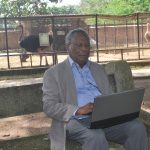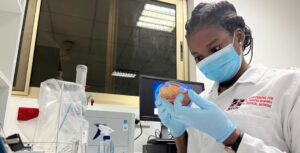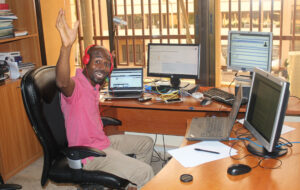
Could digital tools, AI, and social learning spaces help to reduce inequity in knowledge systems?
Earlier this year we called for project ideas to harness digital technologies to advance research and knowledge in the South. Jonathan Harle discusses the three projects selected.
How can Guatemala’s scientific diaspora be more closed engaged in building the nation’s knowledge system? Can digital tools and machine learning help to map and characterise this community, and to connect them better to each other and to knowledge communities in Guatemala?
In Cameroon, could better data on entrepreneurship and employment and the wider business climate enable better policy and programmes to be designed to support of support young entrepreneurs? Could digital tools be harnessed to collect better and more relevant data, and make it available to a community of researchers, entrepreneurs and policymakers?
How can digital tools and artificial intelligence (AI) break some of the barriers in scientific collaboration, communication, and the use of research evidence across the African region? Can they help to foster greater transdisciplinarity in research and evidence use? Could the development of new web applications help to do this?
Three teams – spanning Guatemala, Brazil, Germany, USA, Cameroon, Ghana, South Africa and Eswatini – will be undertaking surveys and convening a series of events over the coming months to try to answer these questions, and to identify practical, digital responses.
We received over 60 responses to our recent call for partners to help develop our ideas for an AI-enabled social learning platform. There were many great ideas but we selected three that we felt had a clear idea of what they wanted to do, a good idea for how to do it, and that had a close fit to our wider ambitions for this project. We are looking forward to working with them over the next few months, to learn alongside them, and to see whether the collective intelligence and creativity can identify good ideas and generate some practical solutions that could be developed and prototyped in a successive stage of the project.
Climate crisis, technological transitions, pandemic diseases and the changing nature of work are all affecting different countries and communities in different ways. Our starting point is that the world needs new forms of knowledge, that is produced in new ways, if it is to respond. That knowledge needs to be relevant, responsive to the needs of society, and to be embedded in local research systems. Realising that is often very challenging, particularly for Southern researchers and research users. Evidence from the North often dominates search results, and much valuable knowledge is still hard to locate in digital form.
Digital tools for research are not new but in the last 18 months we have seen more of their potential, as well as been reminded of their limitations. Technology can help us overcome the barriers of distance to enable collaboration across professions and regions. However, it can also pose additional barriers to accessibility and equity.
What does community-driven social learning look like?
We believe there is more that can be done, and that digital tools, spaces, platforms and communities can help. Building on the successes of AuthorAID, and a series of conversations in 2020 with a group of researchers and evidence users in the South that began to develop these ideas further, we want to explore what a community-driven, social learning environment might look like.
It could be a space or series of spaces, a set of tools or a means to access and share knowledge. It could connect and sustain a global community that spans disciplinary and thematic expertise, and create a critical mass of knowledge and experience. It could connect evidence producers and evidence users and provide spaces through which they can identify research questions and develop new initiatives. It could provide a foundation from which research institutions can be supported and empowered to develop their own learning programmes, connecting digital communities to locally run, in-person training and mentoring, and offering routes towards institutional sustainability.
These are very much “ideas in progress”, which is why we’re working with our network and developing new partnerships to take them forward. New people bring new ideas, new ways of looking at problems, and new possibilities to solve them. We are excited to see what the three teams discover, and hope they will help us to grow the community and connect to new ideas and new talents as we do.
About the teams:
Engaging the Guatemala Science Diasporas for Development: Network building and shared learning. OWSD-Guatemala (Guatemala, Brazil, Germany, USA).Team: Dr Kleinsy Bonilla, Dr Claudia Romero, Dr Susana Arrechea, Nereyda Ortiz
Establishment of an AI- enabled social platform to promote and support youth entrepreneurship and improvement of the business climate. Africa Capacity Development Consulting, Cameroon. Team: Dr Pierre Abomo, Mireille Ntchagang
Breaking barriers in science communication and collaboration in African countries using AI. University of Ghana with the universities of Witwatersrand (South Africa) and Eswatini: Team: Emmanuel Olamijuwon, Dr Fidelia Dake, Dr Stephen Fashoto, Jeremiah Olamijuwon
Cover image: ValentynaK, Shutterstock

 Previous Post
Previous Post


